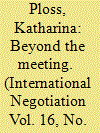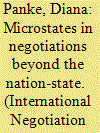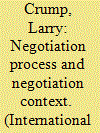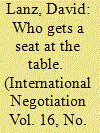| Srl | Item |
| 1 |
ID:
105189


|
|
|
|
|
| Publication |
2011.
|
| Summary/Abstract |
Intercommunity dialogue encounters are a crucial tool for constructive conflict resolution. This research examines grassroots dialogue encounters with regard to the societal position of the participants, as well the situation `on the ground' as influential to the transfer process. Interviews in Northern Ireland and Kosovo with community activists stressed the effectiveness of personal characteristics of dialogue participants when it came to transfer. Moreover, the readiness - affected by socio-economic conditions as well as external/secondary conflict parties - of the peer group to listen to its participant seemed fundamental.
|
|
|
|
|
|
|
|
|
|
|
|
|
|
|
|
| 2 |
ID:
105186


|
|
|
|
|
| Publication |
2011.
|
| Summary/Abstract |
In the 1990s, Taiwan and China conducted over twenty rounds of negotiations through the semi-official Strait Exchange Foundation (SEF) and the Association for Relations across the Taiwan Strait (ARATS) concerning the following issues: notarized papers, registered mail, illegal immigration, fishing disputes, airplane hijacking, and post-1997 shipping links between Taiwan and Hong Kong. Regrouping these issues into rights, law-and-order, and shipping, this study analyzes the differences in the negotiation processes and outcomes through variations of value-interest alignments and their perceived impact on future policy objectives.
|
|
|
|
|
|
|
|
|
|
|
|
|
|
|
|
| 3 |
ID:
105188


|
|
|
|
|
| Publication |
2011.
|
| Summary/Abstract |
Malta, Cyprus and Luxembourg are sovereign states with less than one million inhabitants and, consequently, are often referred to as "microstates." This article inquires into the negotiation activities and conditions for success of microstates in negotiations beyond the nation-state. It develops a set of hypotheses on negotiation activity and on negotiation success and tests them qualitatively by drawing on the example of day-to-day negotiations in the European Union. Luxembourg is considerably more active than Malta and Cyprus. This is due to differences in domestic coordination practices (performance and cooperation between lead ministries and Permanent Representations), as well as different negotiation styles (proactive vs. reactive). Microstates can be influential, if they actively participate in negotiations for issues of high importance and if they select effective strategies in the given setting. Thus, microstates can sometimes turn into successful shapers of law beyond the nation-state - despite their slimmer administrations, fewer staff and - on average - negligible bargaining power.
|
|
|
|
|
|
|
|
|
|
|
|
|
|
|
|
| 4 |
ID:
105184


|
|
|
|
|
| Publication |
2011.
|
| Summary/Abstract |
This article examines how external events grounded in a negotiation's relevant environment (i.e., negotiation context) influence negotiation process and outcome. Multilateral, regional and bilateral environments are examined through linkage theory to gain understanding about the impact of external events or context on negotiation process and outcome. Linkages between a negotiation and its context are examined through five trade negotiations: the WTO Doha round (multilateral-global); the Free Trade Area of the Americas (multilateral-regional); EU-Mercosur (bilateral-regional); EU-Chile (bilateral); and US-Chile (bilateral). In addition to developing greater understanding about the strategic relationship between a negotiation and its context this article establishes a theoretic framework that defines the known universe of linkage dynamics. The impact of multilateral environments on the regional negotiation process and outcome is of particular interest, as is the strategic use of bilateral environments in seeking to achieve multilateral geopolitical ends.
|
|
|
|
|
|
|
|
|
|
|
|
|
|
|
|
| 5 |
ID:
105185


|
|
|
|
|
| Publication |
2011.
|
| Summary/Abstract |
While many individuals speak of China as a single trading partner, in reality Greater China consists of at least three regional subcultures - the People's Republic of China, Hong Kong, and Taiwan. These regions differ in terms of their historical development, values, and traditions, which have implications for what to expect in negotiations. This article examines the cultural differences found in these three regions of Greater China, with particular attention to an often overlooked yet critical stage of the negotiation process - the initiation stage. Using data from the GLOBE Study on cultural practices and values, propensity to initiate a negotiation (engage a counterpart, make a request or demand, and optimize that request) is estimated for each regional subculture. The implications of these findings for practitioners and future research are discussed.
|
|
|
|
|
|
|
|
|
|
|
|
|
|
|
|
| 6 |
ID:
105187


|
|
|
|
|
| Publication |
2011.
|
| Summary/Abstract |
Who gets a seat at the table and who does not is an important consideration for successful peacemaking. However, current research does not provide sufficient guidance for understanding the politics of participation in peace negotiations. This article develops a conceptual framework for understanding these dynamics. Its central theme is that the inclusion or exclusion of a given actor in peace negotiations is affected by two independent factors. One factor pertains to the practical requirements of the peace process and addresses the following question: does the participation of a given actor augment the chance of reaching a sustainable peace settlement? The other factor relates to the normative dimension of peace talks: is the participation of a given actor consistent with the values of international mediators and sponsors of peace negotiations? The article argues that the dynamics of inclusion and exclusion result from the interplay of these two factors. The most straightforward situation for mediators is when practical requirements and international norms are mutually reinforcing. Difficulties arise from scenarios where practical effectiveness and norms contradict each other. This is the case when the involvement of a given person (or group) is imperative in terms of the peace process, but difficult to justify politically because this person has committed terrorist acts or is indicted by an international court.
|
|
|
|
|
|
|
|
|
|
|
|
|
|
|
|